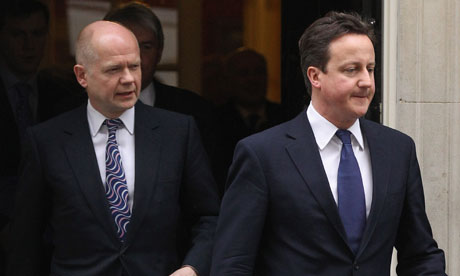There is a whiff of panic about Cameron and Hague's strategy on Libya. To say it has been clueless is almost to be too kind
By Peter Beaumont
This commentary was published in The Guardian on 07/04/2011
This commentary was published in The Guardian on 07/04/2011

'David Cameron and William Hague have rushed into a potentially drawn-out air campaign with a principal partner –the US – which has little interest in fighting this war.' Photograph: Oli Scarff/Getty Images
Since the beginning of the crisis in Libya there has been a whiff of panic about the diplomatic, humanitarian and military strategy pursued by the government of David Cameron. Acting on media reports of the bombing of peaceful demonstrations and widespread atrocities allegedly carried out by mercenaries – not all of which proved to be true – Britain pushed for sanctions against Colonel Muammar Gaddafi at the UN.
What followed next was a half-baked and ill-conceived air campaign to protect civilians, officially, but unofficially to ensure the removal of Gaddafi and his regime.
In purely military terms, it was ill-considered for several reasons.
Analysis of the stability of the regime, applied by officials and politicians to the crisis, has been woefully lacking. People have bought into the hype that the regime – particularly in the country's west – is more fragile than it is.
The same analysts have bought into another kind of hype as well – that which has described the rebels as a politically and militarily coherent entity that was nationally representative.
Now, confronted with the prospect of stalemate on the battlefield between the regime's forces, which have begun guarding their military assets from coalition air attacks, and a weak and disorganised opposition stalled in the desert, the same officials are pushing another bright idea.
This time the notion is that ex-British special forces trainers can – in perhaps no more than a month – transform the rebels into a proper fighting force. Not to win on the battlefield, it has to be said.
Certainly not to conquer Tripoli, which even Whitehall's bright sparks now recognise is a pipe dream.
No, their function would be to help the rebels break out of their power base in the east to apply sufficient pressure so that the ceasefire, when it comes, would be a ceasefire not on Gaddafi's terms – an increasing risk – but one that would insist on his departure.
To add to the sense of unreality surrounding the latest proposal to emerge from out of Whitehall, these British mercenaries would be paid for by Arab countries so as not to give the impression that somehow British soldiers – or ex-soldiers – were fighting Gaddafi loyalists at the British government's behest.
While it is clear that the serious events in Libya, where the regime targeted civilians demanding a more open and representative society, requires a strong international response, the tactics employed so far have been incoherent and muddled, the coalition riven by dangerous disagreements.
Amid all this, to say British strategy has been clueless is almost to be too kind. Cameron and William Hague have rushed into a potentially drawn-out air campaign with a principal partner – the US – which has little interest in fighting this war, and which has now removed most of its military assets from the battle.
With the aircraft necessary to prosecute the campaign – US Warthogs and Spectre gunships – departed, the air strategy, effective at first in grounding Libya's airforce and halting its armour, suddenly looks increasingly toothless. This not least because the coalition's allegedly "protective" campaign does not allow it to take measures to force the regime change that it really desires.
With a real lack of appetite for the use of foreign ground forces and no great enthusiasm either for arming the rebels, the room for manoeuvre for breaking any stalemate was always going to be tiny.
What is required now is realism, not least in the weak justification of the training plan through comparisons with the support given by the west to the Afghan Northern Alliance before the fall of the Taliban. The Northern Alliance, unlike Libya's rebels, was a reasonably cohesive, well-motivated and experienced force.
There is another comparison that has occasionally emerged in the last few weeks in support of the training argument. In November 1994, a then little-known organisation took on the contract – encouraged by the US government – to train Croatia's demoralised armed forces, which had been badly mauled by Serb opponents.
That company was MPRI and 10 months later – not a month, it should be noted – Croatian forces routed the Serbs in the Krajina during Operation Storm, which led both to a huge refugee crisis and saw human rights abuses committed.
There is an expression for what is happening in Libya today – it is "mission creep" – in a mission that is dangerously ill defined and ambiguous, that with each move appears to throw its hand in ever more closely with a fractured opposition whose ability to govern meaningfully, even in Benghazi, remains open to question.
It is right that we protect those who cannot protect themselves.
What has not been debated is whether, as is increasingly becoming obvious, we should be taking sides in a civil war, and clumsily at that.
No comments:
Post a Comment